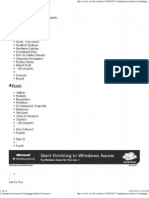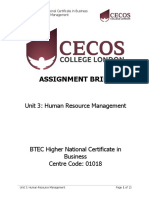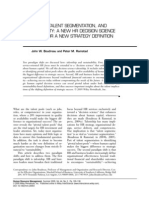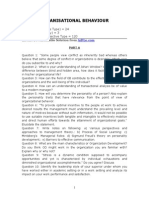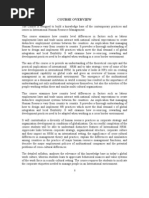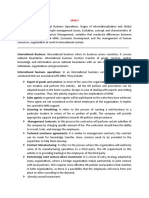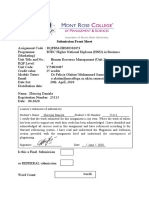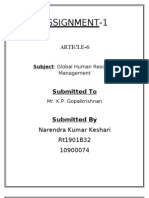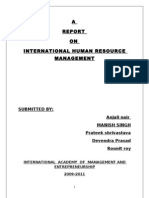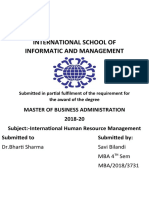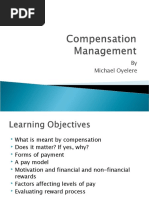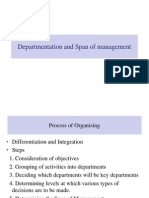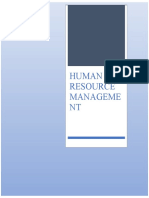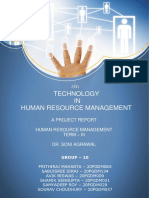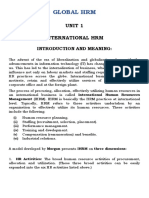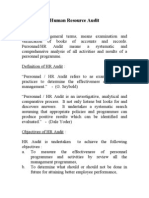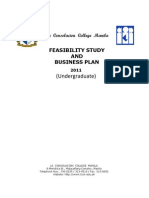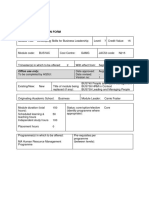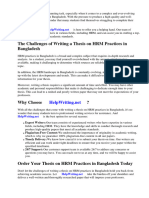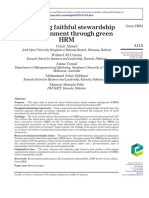Global HRM 315-01 El Farr-SP16
Global HRM 315-01 El Farr-SP16
Uploaded by
Elzein Amir ElzeinCopyright:
Available Formats
Global HRM 315-01 El Farr-SP16
Global HRM 315-01 El Farr-SP16
Uploaded by
Elzein Amir ElzeinOriginal Description:
Copyright
Available Formats
Share this document
Did you find this document useful?
Is this content inappropriate?
Copyright:
Available Formats
Global HRM 315-01 El Farr-SP16
Global HRM 315-01 El Farr-SP16
Uploaded by
Elzein Amir ElzeinCopyright:
Available Formats
Course Syllabus
Rutgers University
School of Management and Labor Relations
Human Resources Management Department
2016
37:533:315:01 Global Human Resource Management
Contact details
Class details
Instructor: Hadi El-Farr, PhD
Office: 215E Janice H. Levin
Telephone: (848)445-9432
Email: he89@scarletmail.rutgers.edu
Website: http://www.hadielfarr.com/
Office hours: Mondays 1:30PM-3:00PM
Thursdays 1:30PM-3:00PM
Or by appointment
Other office hours attended by the teaching
assistant will be assigned later on
Section: 001
Day: Mondays & Thursdays
Time: 10:20AM-11:40AM
Location: TIL 264
37:533:315 Global Human Resource Management
Human Resources Management Department 2016
Table of Contents
1. Course Description.................................................................................................................................... 3
2. Course Details ........................................................................................................................................... 3
3. Reading List .............................................................................................................................................. 5
4. Assessment................................................................................................................................................ 5
5. Polling Instructions ................................................................................................................................... 8
6. Course Requirement and Instructor Expectations ..................................................................................... 8
7. Academic Honesty and Code of Conduct ................................................................................................. 9
8. Special Needs and Accommodation ....................................................................................................... 10
9. Attendance Policy ................................................................................................................................... 10
10. Tentative Course Schedule.................................................................................................................... 11
37:533:315 Global Human Resource Management
Human Resources Management Department 2016
1. Course Description
The trend of business internationalization has been exponentially increasing since the last century. This is
demonstrated in the growth of the number of enterprises conducting business across the national borders
of their headquarters, the amount of foreign direct investment (FDI) and the value of trade between
countries.
In 2010 alone, more than 82,000 multinational enterprises with more than 810,000 affiliates operated
worldwide. Moreover, in 2013, the global FDI reached $1.45 Trillion a 9% growth compared to 2012
(UNCTAD, 2014). The global FDI is projected to continue its growth for the coming years, reaching $1.6
Trillion, $1.75 Trillion and $1.85 Trillion in 2014, 2015 and 2016 simultaneously (UNCTAD, 2014).
Furthermore, in 2012, the collective WTO members exports of merchandise and commercial services
reached around $21.55 Trillion around 30% of the Worlds GDP (WTO, 2013). As a rough estimation,
the total of 60-70% of the international trade takes place within the same multinational groups (Sheppard,
2012, from www.taxjustice.net).
Based on the preceding figures, organizations are internationalizing their operations aggressively some
are even being born as a global enterprise. This trend has a direct impact on the HR function. HR
professionals are expected to plan and manage a nationally and culturally diverse workforce. Moreover,
they are expected to manage migrant workers and international assignees at each geographical location, in
addition to its local employees.
Therefore, this course aims at clarifying global HRM practices. To begin with, the course displays the
drivers of business internationalization and the levels of corporate global integration. Then, the course
outlines the structural alternatives for multinational enterprises and the cultural/national and legal
considerations to account for. Afterwards, the course addresses strategic international HRM and the
employment cycle within an international context.
2. Course Details
Instructor
Credits
Semesters
Program of Study
Target Audience
Course Learning
Objectives
SMLR Learning
Hadi El-Farr
3
Spring
Undergraduate Human Resources Management
This course is an optimal learning experience for:
Students aiming for a career in Human Resources
Students seeking knowledge of Global People Management
Managers seeking to improve their People Management skills and interested in
implementing effective Global HR practices.
Employees involved in HR practices such as staffing and performance
management within a global environment
Students who complete this course will demonstrate an understanding of:
Drivers for internationalization and the choices businesses have to organize
their international operations
Various cultural and legal contexts
The impact of business internationalization on strategic HRM and its various
functions, including HR planning, recruitment& selection, training&
development, compensation management, performance management, safety&
health and employee relations.
Research Skills Demonstrate an ability to collect, analyze and synthesize
3
37:533:315 Global Human Resource Management
Human Resources Management Department 2016
Objectives
information to make logical and informed decisions impacting the workplace.
Use evidence to evaluate hypotheses, theories and approaches to workplace
issues.
Employ current technologies to access information, to conduct research, and to
communicate findings
Analyze and synthesize information and ideas from multiple sources to generate
new insights
Assess and critique relevant evidence and research findings
Access high-quality historical, qualitative, and quantitative evidence or research
Use evidence-based analysis to appraise the validity of various hypotheses,
theories, and approaches to workplace issues
Understanding Context - Evaluate the context of workplace issues, public
policies, and management decisions
Analyze the degree to which forms of human difference shape a persons
experience of, and perspectives on work
Analyze a contemporary global issue in their field from a multi-disciplinary
perspective
Analyze issues related to business strategies, organizational structures,and work
systems
Analyze issues of social justice related to work across local and global contexts
(LSER)
Analyze issues related to the selection, motivation, and development of talent in a
global context (HRM)
Professional Development Demonstrate an ability to interact with and
influence others in a professional manner, and to effectively present ideas and
recommendations
Topics
Develop effective presentation skills appropriate for different settings and
audiences
Develop career management skills to navigate ones career
Understand cultural differences and how to work in a multicultural environment
Work productively in teams, in social networks, and on an individual basis
Develop cultural agility competencies
Demonstrate lifelong personal & professional development skills
The Internalization of HRM
Strategic International HRM
Design and Structure of the Multinational Enterprise
International Mergers & Acquisitions, Joint Ventures and Alliances
International HRM and Culture
International Employment Law, Labor Standards and Ethics
International Employee Relations
International Workforce Planning and Staffing
International Recruitment, Selection and Repatriation
International Training and Management Development
International Compensation, Benefits and Taxes
International Employee Performance Management
Well-Being of the International Workforce, and International HRIS
Comparative IHRM: Operating in Other Regions and Countries
The IHRM Department, Professionalism and Future Trends
37:533:315 Global Human Resource Management
Human Resources Management Department 2016
3. Reading List
Readings for this course will be selected from the following textbook:
Tarique, I., Briscoe, D. and Schuler, R. (2016). International
Human Resource Management: Policies and Practices for
Multinational Enterprises. Fifth edition. London: Routledge.
ISBN-13: 978-0415710534
ISBN-10: 0415710537
Link: https://www.routledge.com/products/9780415710534
Additional optional readings and useful links will be added as
needed. They will be available on the courses Sakai website. ,
along with other course material. Please, make sure to check
the course website frequently, so you wont miss any
important material (https://sakai.rutgers.edu).
Make sure to read all assigned readings before attending
classes in order to optimize your learning experience.
Case studies for the team projects will be selected from the following textbook:
Hayton, J.C., Biron, M., Christiansen, L.C. and Kuvaas, B.
(2012). Global Human Resource Management Casebook.
London: Routledge.
ISBN-13: 978-0-415-89371-8
Link: http://www.routledge.com/books/details/9780415893718/
4. Assessment
The assessment criteria abide by the Undergraduate Grades and Records Policy:
http://catalogs.rutgers.edu/generated/nb-ug_current/pg1344.html. Moreover, it is useful to read the New
Brunswick Undergraduate Catalog in order to know your rights and obligations at:
http://catalogs.rutgers.edu/generated/nb-ug_current/pg1341.html. The following table lists the assessment
methods:
37:533:315 Global Human Resource Management
Human Resources Management Department 2016
Method
Attendance & Participation
Exam I
Exam II
Exam III
Paper& Presentation
Total
Points
50
100
100
100
100
450
The following table lists the Grading and Point System assigned by the university:
Points
405-450
382-404
360-381
336-359
315-335
292-314
291
Percent
90-100%
85-89%
80-84%
75-79%
70-74%
65-69%
64%
Grade
A
B+
B
C+
C
D
F
Description
Outstanding
Good
Satisfactory
Poor
Failing
Grade Points
4.0
3.5
3.0
2.5
2.0
1.0
0.0
A. Attendance & Active Participation
Just by attending and actively participate in the assigned sessions you earn up to 50 points. Each missed
class results in losing significant points unless proper justification is provided. Please refer to the
attendance policy to familiarize yourself with the recognized grounds for absences. Attendance will be
monitored through Poll Everywhere and/or attendance sheets.
Also, students are expected to actively participate in class and online forums. In addition to earning
points, students will have the opportunity to add their input, share experiences and learn from others.
Points are gained through answering the Poll questions and providing insightful contributions. Points are
lost for frequent absenteeism, being unprepared and misconduct during class. Therefore, you are expected
to be well prepared before class sessions through reading the required readings and preparing yourself for
discussions.
Also, to participate through Poll Everywhere you need to bring your mobile phone, tablet or laptop. If
unable to obtain any of those devices, please contact me to arrange an alternative method for
participation. You need to register with the Poll Everywhere website at least 24 hours before the third
class (please refer to the Polling Instructions below for the registration instructions). You can respond to
the Poll questions through text messages or via the web browser.
B. Exams
There are three noncumulative exams with equal weights (two midterms and one final). The exams
consist of multiple-choice and true-false questions. Each exam covers five chapters. The material includes
lectures, discussions, exercises and readings. The exams dates are fixed and noted in the course schedule.
Please note that all exams are closed-book. If the examination session was cancelled, then the exam will
be automatically rescheduled for the next regular session.
6
37:533:315 Global Human Resource Management
Human Resources Management Department 2016
Make-up policy
Again, the dates of each of the three exams are noted on the course agenda. An exam grade of zero (0)
will be assigned to any student who is absent without a legitimate excuse on the date of a regularly
scheduled test. Legitimate excuses include illness (verified with a note from a doctor), inclement weather
(only when the Rutgers Information Service, 732-932-INFO, indicates that Rutgers is closed), and others
as assigned by Rutgers Attendance Policy (please refer to the attendance policy section). An individual
make-up exam will be held at a time that is convenient for the instructor. Individual make up exams will
be in essay and/or short answers format.
C. Extra Credit Assignments
During the semester, you will have the opportunity to submit two assignments in order to improve the
grades of the two midterm exams. Each assignment will contribute to up to 10 points. The two
assignments are optional and will be in essay and/or short answers format. Submission dates of both
assignments will be the end of next week after the examination date. Late submissions are strictly not
acceptable. Assignments should be both uploaded on the Sakai website and a hard copy submitted to the
Teaching Aids.
D. Paper& Presentation
Project Description & Performance Guidelines
The course will provide an extensive overview of International HRM. However, when businesses
internationalize, the HR professionals should familiarize themselves with the specific context of the
targeted market. Those projects aim to familiarize students with various national contexts from different
regions, thus further broadening the course content. Moreover, the project aims to strengthen your
teamwork, presentation, analytical and written communication skills.
Students will have the opportunity to self-select each other and form teams. More so, each team will have
the freedom to choose one national context from the aforementioned assigned casebook. However, if you
fail to find a team or choose a case study by the time limit assigned at the course schedule, then the
instructor will select on your behalf.
In total, there will be 20 teams: each is formed of 5 to 6 students. Each team will be covering one
distinctive country, thus no two or more teams will be allowed to cover the same case study. Therefore,
the sooner you decide on the country, the more likely it will be assigned to you. The following is the list
of countries/case studies:
I.
II.
III.
IV.
Case Studies from Western Europe: Germany, Italy, Netherlands, United Kingdom
Case Studies from Scandinavia: Denmark, Finland, Sweden
Case Studies from Central & Eastern Europe: Bulgaria, Poland, Russia
Case Studies from Mediterranean, Middle East, and Africa: Ghana, Uganda, United Arab
Emirates
V. Case Studies from Asian and the Pacific Rim: China, India, Indonesia, Singapore
VI. Case Studies from the Americas: Canada, Chile, Mexico
The project consists of a paper and presentation. The paper size should not exceed 2500 words and the
presentation time is 15 minutes (+5 minutes for discussion). Both should cover the following:
7
37:533:315 Global Human Resource Management
Human Resources Management Department 2016
1. Overview of the country and its business climate (500 words, 2 minutes)
2. HR challenges that a multinational firm might face within the given context (500 words, 3
minutes)
3. Overview of the case study (500 words, 5 minutes)
4. Critical answers to the questions at the end of the case study (1000 words, 5minutes)
The deadline for submitting the report is the same day and time assigned for your presentation day.
You need to bring a physical copy of your report and presentation to class and hand it to the
instructor at the date assigned for the presentation. Late submissions are not accepted. Each group
will submit one report.
5. Polling Instructions
During the sessions, you will be presented with poll questions to answer through the PollEverywhere
website. The site allows you to respond to polls in various methods: (1) text messages through mobile
phones and (2) web browser through your laptops/tablets/smart phones. Therefore, you are permitted to
use the aforementioned devises strictly while responding to poles. Using electronic devices is not allowed
otherwise.
The aim of the polls is to take attendance, to confirm you comprehension of the subject and to expose of
sample exam questions. Accordingly, you need to register with PollEverywhere before attending the third
session through following the instructions at this link: www.polleverywhere.com/register?p=2cwgm1971&pg=WDU50YA&u=zKS17IVl
Upon accessing the link provided above, you may see the statement Youre registering as a participant
for Rebecca A Tinkham, Rebecca As account. The HRM department has a group license under which
all faculty members might utilize. Rebecca is the undergraduate staff coordinator for our department, and
she is also listed as the administrator on the PollEverywhere departmental license. Please ignore that it
lists her name and continue to follow the instructions as provided.
1. Be sure to complete all the registration steps, including the certification of your cell phone (If you
intend to text your responses).
2. If you are already registered with PollEverywhere for a different class in the HR department,
please email the Teaching Assistant and s/he will add you to this specific course.
3. In part, this is how participation/attendance is tabulated. Coming to class late, or attending but not
responding to that days poll, will be considered a non-attendance. It is your responsibility to
respond to the polls so that your attendance/participation is recorded.
4. You may check your own responses to confirm submission through logging in to the
PollEverywhere website (www.polleverywhere.com) and clicking on My Response History. You
are encouraged to track your responses in order to address issues as soon as possible.
6. Course Requirement and Instructor Expectations
Students are expected to read all the required readings before attending the class. This increases
the learning capacity throughout the sessions and elevates the interaction level among students
and between the attendees and the instructor.
37:533:315 Global Human Resource Management
Human Resources Management Department 2016
Attendance and active participation in class discussions and activities fulfill the learning
outcomes of classes. Remember both are assessed and contribute to your final grade!
Students are asked to check Sakai frequently at least every 48 hours. The course material,
additional readings, posts and announcements will be added regularly and will enhance your
learning experience.
All required materials for the course are subject to formal assessment, even if they were not
covered in class. Remember that the instructor is merely a facilitator of your learning experience.
Attaining the utmost knowledge of the course subjects is highly dependent on individual effort
and peer involvement.
For each 3 credits of study, students should expect to commit at least 100 hours of their time for
course work, self-study and revision.
The instructor will continuously provide feedback and whenever a student requests help. Students
are encouraged to contact their instructor for one-on-one sessions if needed.
If any conflicts arise between group members, then they should be addressed as soon as possible.
If students fail to resolve the conflicts among group members, then they should seek the
assistance of the instructor ASAP.
Reports should be submitted by due date. Late submissions are not accepted unless you provide a
legitimate excuse. Early submissions can be prearranged with your instructor.
Students are expected to behave in a professional manner. Failing to do so will affect your
participation grade. The following are some guidelines:
o Students are expected to arrive on time in order to avoid distractions and to show respect
for the instructor and peers.
o Electronic devices should not be used during the session except for class requirements.
o Students are expected to behave ethically. Misconduct during the session will not be
tolerated.
7. Academic Honesty and Code of Conduct
Students are expected to abide by Rutgerss Academic Integrity Policy and Code of Student Conduct.
Acts of cheating, plagiarism, forgery, fabrication or misrepresentation are not tolerated and will be dealt
with according to the university policies and procedures. If you have doubts concerning committing a
potential act of academic dishonesty, please contact the course instructor for advice. Moreover, you are
advised to check the websites of the Office of Academic Integrity at: http://academicintegrity.rutgers.edu/
and the Office of Student Conduct at: http://studentconduct.rutgers.edu/. The following documents are
also useful to know your rights and responsibilities:
Academic Integrity Policy: http://studentconduct.rutgers.edu/files/documents/AI_Policy_2013.pdf.
Code of Student Conduct: http://studentconduct.rutgers.edu/files/documents/UCSC_2013.pdf.
In addition, the Undergraduate Program has a strict policy concerning any form of cheating (including
cheating incidents at exams and plagiarism. The following is the Undergraduate Program Policy on
Cheating:
The goal of this policy is to make sure students in the UG HRM program fully understand that cheating
will not be tolerated and there are serious consequences for first time cheaters and catastrophic
consequences for repeat offenders. This policy applies solely to the Undergraduate HRM Program.
The faculty members of the undergraduate program condemn any form of cheating. Any student found to
have cheated will receive a zero on the assignment or test on which the cheating occurred. In addition,
the students final grade will be reduced by an entire letter grade as shown in the table below.
37:533:315 Global Human Resource Management
Human Resources Management Department 2016
Original
Grade
A
B+
B
C+
C
D
Grade After
Deduction for
Cheating
B
C+
C
D
D
F
When students cheat a note will be placed in their files in the HRM Department and such information will
be taken into account by the Admissions Committee for the MHRM Program. Further, on the first
offense, students will be required to meet with the HRM Undergraduate Program Director to discuss the
offense and the subsequent penalty.
A second incidence of cheating (whether in the same class or in another HR class) will result in a grade of
F and a referral to the appropriate School and University authorities.
In the case of cheating on group work, all members of the group will be held responsible and suffer the
consequences noted above. Students have the responsibility to make sure that any work with their name
on it meets the integrity standards of the HRM Department and the University.
No extenuating circumstances will be considered in a case of cheating.
8. Special Needs and Accommodation
Rutgers University welcomes students with disabilities into all of the University's educational programs.
In order to receive consideration for reasonable accommodations, a student with a disability must contact
the appropriate disability services office at the campus where you are officially enrolled, participate in an
intake interview, and provide documentation: https://ods.rutgers.edu/students/documentation-guidelines.
If the documentation supports your request for reasonable accommodations, your campuss disability
services office will provide you with a Letter of Accommodations. Please share this letter with your
instructors and discuss the accommodations with them as early in your courses as possible. To begin this
process,
please
complete
the
Registration
form
on
the
ODS
web
site
at:
https://ods.rutgers.edu/students/registration-form. For additional information, please visit the website of
the Office of Disability Services at: https://ods.rutgers.edu/students.
9. Attendance Policy
Attendance at all scheduled classes shall be expected. Failure to attend classes with no authentic excuse
will negatively affect your grade as attendance and participation are accounted for in the course
assessment. Rutgers University Attendance Policy has assigned the following recognized grounds for
absences:
1. Illness requiring medical attention (written proof is needed).
2. Curricular or extracurricular activities approved by the faculty.
3. Personal obligations claimed by the student and recognized as valid (pre-approved by the
instructor unless it is a family emergency).
4. Recognized religious holidays (please refer to the links at the end of this section).
10
37:533:315 Global Human Resource Management
Human Resources Management Department 2016
5. Severe inclement weather causing dangerous traveling conditions (Rutgers University usually
cancels classes when the weather conditions are not safe for commute).
As a general guideline, students have to attain the instructors approval before their day of absence unless
it is an emergency. At least two weeks notice is required before any examination date. If the cause of
absenteeism is legitimate, then the instructor will work with the student to make-up required exercises and
examinations. The following links further clarify the attendance policy:
Rutgers Attendance Policy: http://policies.rutgers.edu/view-policies/academic-%E2%80%93-section10#2
Rutgers Religious Holiday Policy: http://scheduling.rutgers.edu/religious.shtml
Interfaith Calendar: http://www.interfaithcalendar.org/index.htm
NJ Department of Education Religious Holiday List: http://www.state.nj.us/education/genfo/holidays.htm
10. Tentative Course Schedule
The course will be delivered through 28 assigned sessions, mostly twice per week. The course content
will be covered based on the sequence specified in the next page. Please note that the dates are tentative
and subject to change. Also, note that the two midterm exams are set during class hours. The final exam
time and location will be assigned by the university and will take place during the final exams days.
Sessions will include the following delivery methods and activities:
Lectures covering the main course topics: concepts, theories and practices in HRM.
Case studies that contextualize the course topics with real business examples and enhance
knowledge-sharing and interaction among the session attendees including the instructor. In
addition, they aim to refine your analytical and communication skills.
Presenting group work to other classmates, thus enhancing knowledge-sharing and strengthening
your presentation skills.
Formal assessments of students knowledge attained throughout the course delivery.
11
Week
Date
Topic
Learning Outcomes
Thursday
01/21/2016
Introduction to the
course
Monday
01/25/2016
The Internalization of
HRM
Thursday
01/28/2016
Strategic
International HRM
HRM
Outlining the course syllabus
Understanding the course structure and students responsibilities and
rights.
Describe the many drivers of the internationalization of business
Describe the growth and spread of internationalization
Describe the different settings of international human resource
management
Discuss the development of international human resource management
Describe the development of SIHRM and the process of international
strategic management
Describe the evolution of the MNE in terms of various stages of
internationalization and the methods firms use to enter international
markets
Describe the process for developing MNE strategy and IHRM strategy
and the relationship between the two
Explain the fundamentals of organizational design and Structure and
explain the process of designing an MNE
Describe the basic characteristics associated with different organizational
structures
Explain the implications for IHRM from the different structures
Describe the importance of teams, networking, and the need for learning
in MNEs
Describe the basic nature of international mergers and acquisitions,
international joint ventures, and international alliances
Explain the major IHRM implications from international mergers and
acquisitions, international joint ventures, and international alliances
Define the IHRM professionals role in implementing effective
international mergers and acquisitions, international joint ventures, and
international alliances
Define and explain the concept of culture
Explain the importance of culture in IB
Describe the basic research findings of Hofstede and Trompenaars
Explain the importance of culture to IHRM
Law,
Describe the three major legal systems and their key differences
Describe international labor law and standards and explain their impacts
Monday
02/01/2016
Thursday
02/04/2016
4
Monday
02/08/2016
Design and Structure
of the Multinational
Enterprise
Design and Structure
of the Multinational
Enterprise
International Mergers
& Acquisitions, Joint
Ventures
and
Alliances
Thursday
02/11/2016
International
and Culture
HRM
Monday
02/15/2016
International
and Culture
Thursday
02/18/2016
International
Employment
Required
Readings
Syllabus
In-class
Activities
Lecture
Group Formation
Outside of class
responsibilities
Read Ch1
Group Formation
Ch.1
Lecture
Group Formation
Read Ch.2
Group Formation
Ch.2
Lecture
Case study
Group Formation
Read Ch.3
Group Formation
Ch.3
Lecture
Case study
Read Ch.3
Decide on the case
study
Ch.3
Lecture
Case study
Ch.4
Lecture
Case study
Read Ch.4
Decide on the case
study
Read Ch.5
Research the case
study
Ch.5
Lecture
Case study
Ch.5
Lecture
Case study
Ch.6
Lecture
Case study
Read Ch.5
Research the case
study
Read Ch.6
Research the case
study
Read Ch.6
Prepare for the exam
37:533:315 Global Human Resource Management
Human Resources Management Department 2016
Labor Standards and
Ethics
International
Employment
Law,
Labor Standards and
Ethics
Exam 1
List and describe the goals of the various international trade agreements
Integrate existing employment laws and regulations, ethical standards,
CSR, and corporate governance into IHRM policies and practices
Monday
02/29/2016
International
Employee Relations
Thursday
03/03/2016
International
Workforce Planning
and Staffing
Monday
03/07/2016
International
Recruitment,
Selection
Repatriation
International
Recruitment,
Selection
Repatriation
Monday
02/22/2016
Thursday
02/25/2016
Thursday
03/010/2016
Monday
03/14/2016
N/A
and
and
Research the case
study
Prepare for the exam
Ch.6
Lecture
Case study
The exam material covers chapters 1,2,3,4 and 5.
N/A
Examination
Ch.7
Lecture
Case study
Ch.8
Lecture
Case study
Read Ch.9
Working on the report
draft
Submit the optional
extra-credit
assignment
Ch.9
Lecture
Case study
Read Ch.9
Working on the report
draft
Ch.9
Lecture
Case study
Read Ch.10
Working on the report
draft
N/A
N/A
Read Ch.10 & 11
Working on the report
Describe the nature of union membership around the world
Describe the evolution and make-up of global employee relations
Explain the relationship between unions and MNEs.
Describe the various strategies with which MNEs approach global
employee relations
Describe the various approaches taken to non-union worker
representation
Explain the litigation risks in international employee relations
Describe the workforce planning process and the challenges involved in
planning the international workforce for an MNE
Explain the many options available to MNEs for staffing their operations
in terms of the different types of international employees that MNEs can
draw on to staff their operations in the global marketplace
Describe the implications of the different staffing options and the various
types of employees for the MNE
Describe the broad issues involved in staffing subsidiaries with
international assignees or expatriates
Describe the various issues involved in recruiting international assignees
or expatriates
Describe the general process of selection of international assignees (IAs)
for international assignments and the issue of failure in an IA assignment
and reasons for it
Describe the characteristics of successful IA selection programs and
exemplary practices
Explain the essential nature of repatriation
Spring Recess
13
Read Ch.7
Research the case
study
Write the optional
extra-credit
assignment
Read Ch.8
Research the case
study
Write the optional
extra-credit
assignment
37:533:315 Global Human Resource Management
Human Resources Management Department 2016
10
N/A
Spring Recess
N/A
N/A
Monday
03/21/2016
International Training
and
Management
Development
Ch.10
Lecture
Case study
International Training
and
Management
Development
Advocate for training and development programs for the MNEs global
managers and workforce
Identify the challenges of training an international workforce
Explain key learning objectives that drive training programs aimed at
enabling a productive global workforce
Design cross-cultural training programs that enable international
assignees to successfully complete their assignments and develop an
effective global management team
Develop a global mindset, global competencies, and global leadership in
the international organization
Improve the effectiveness of global and virtual teams
Outline the basic objectives of global compensation and benefits (C&B)
Distinguish between global remuneration and international assignment
C&B
Identify critical issues in C&B of the global workforce of the MNE
Ch.10
Lecture
Case study
Read Ch.11
Working on the report
draft
Ch.11
Lecture
Case study
Read Ch.11
Finalizing the report
Describe the types of compensation systems available for international
assignees
Explain the balance-sheet approach, as well as other approaches, of
designing international assignment C&B packages
Identify the challenges of dealing with various tax structures and
methods affecting international assignment
The exam material covers chapters 6, 7, 8, 9 and 10.
Ch.11
Lecture
Case study
Prepare for the exam
Finalizing the report
N/A
Examination
Ch.12
Lecture
Case study
Read Ch.12
Working on the
presentation and
report
Write the optional
extra-credit
assignment
Reach Ch.13
Working on the
presentation and
report
Write the optional
extra-credit
Thursday
03/24/2016
11
12
draft
Read Ch.10 & 11
Working on the report
draft
Read Ch.10
Working on the report
draft
Thursday
03/17/2016
Monday
03/28/2016
International
Compensation,
Benefits and Taxes
Thursday
03/31/2016
International
Compensation,
Benefits and Taxes
Monday
04/04/2016
Exam 2
Thursday
04/07/2016
International
Employee
Performance
Management
Describe the importance of developing an international performance
management system
Explain the characteristics of a successful international performance
management system
Identify and overcome the major challenges to international performance
management
14
37:533:315 Global Human Resource Management
Human Resources Management Department 2016
13
14
15
Monday
04/11/2016
Well-Being of the
International
Workforce,
and
International HRIS
Thursday
04/14/2016
Comparative IHRM:
Operating in Other
Regions
and
Countries
Monday
04/18/2016
The
IHRM
Department,
Professionalism and
Future Trends
Thursday
04/21/2016
Presentations
(Group1-5)
Submit the report and
presentation
for
groups 1-5.
Presentations (Group
6-10)
Submit the report and
presentation
for
groups 6-10.
Presentations (Group
11-15)
Submit the report and
Monday
04/25/2016
Thursday
04/28/2016
Describe the role of cultural value dimensions in the design,
implementation, and evaluation of an international performance
management system
Formulate evaluation criteria and practices that meet parent-company
requirements while addressing the host-cultures norms and expectations
Identify and overcome the major challenges related to the performance
management of international assignees
Explain the importance of global health & Safety
Identify the role of IHRM in health & Safety
Display the importance of HRIS in supporting evidence-based decisions
Identify the major challenges in designing and implementing global
HRIS
assignment
Ch.13
Lecture
Case study
Understand the field of Comparative IHRM
Understand different types of regions in the world
Describe the institutional, economic, and cultural context for IHRM in
different regions
Describe important features of IHRM in Europe, North America, Asia
Pacific, and Latin America
Explain the current debate over the convergence of IHRM across
countries and regions
Describe the ways the IHRM department can obtain more involvement in
the MNE
Explain the role and professionalization of the IHRM manager
The complexities and challenges faced by IHRM
The future of the IHRM department and profession
Presentations (Group1-5)
I. Case Studies from Western Europe: Germany, Italy, Netherlands, United
Kingdom
II. Case Studies from Scandinavia: Denmark
Ch.14
Lecture
Case study
Ch.15
Lecture
Case study
Finalizing the report
and presentation
Matching
cases from
the second
textbook
Case
Study
Presentations
Presentations (Group 6-10)
II. Case Studies from Scandinavia: Finland, Sweden
III. Case Studies from Central & Eastern Europe: Bulgaria, Poland,
Russia
Matching
cases from
the second
textbook
Case
Study
Presentations
Presentations (Group 11-15)
IV. Case Studies from Mediterranean, Middle East, and Africa: Ghana,
Uganda, United Arab Emirates
Matching
cases from
the second
Case
Study
Presentations
Studying for
Exam
Prepare
for
presentations
Report
Studying for
Exam
Prepare
for
presentations
Report
Studying for
Exam
Prepare
for
15
Reach Ch.14
Working
on
the
presentation
and
report
Submit the optional
extra-credit
assignment
Read Ch.15
Working
on
the
presentation
and
report
the
the
&
the
the
&
the
the
37:533:315 Global Human Resource Management
Human Resources Management Department 2016
16
Monday
05/02/2016
presentation
for
groups 11-15.
Presentations (Group
16-20)
Submit the report and
presentation
for
groups 16-20.
V. Case Studies from Asian and the Pacific Rim: China, India,
textbook
Presentations (Group 16-20)
V. Case Studies from Asian and the Pacific Rim: Indonesia, Singapore
VI. Case Studies from the Americas: Canada, Chile, Mexico
Matching
cases from
the second
textbook
Case
Study
Presentations
presentations
Report
Studying for
Exam
The final exam will be assigned by the university. Usually, it will take place at the same class location, except if you were informed
otherwise. The day and time of the final exam will be declared later on during the semester.
The final exam is non-cumulative and the exam material covers chapters 11, 12, 13, 14 and 15
16
&
the
Academic Integrity Contract
(To be signed and turned in at the first class)
All members of the Rutgers University community are expected to behave in an ethical and moral
fashion, respecting the human dignity of all members of the community and resisting behavior that may
cause danger or harm to others through violence, theft, or bigotry. All members of the Rutgers University
community are expected to adhere to the civil and criminal laws of the local community, state, and nation,
and to regulations promulgated by the University. All members of the Rutgers University community are
expected to observe established standards of scholarship and academic freedom by respecting the
intellectual property of others and by honoring the right of all students to pursue their education in an
environment
free
from
harassment
and
intimidation.
Please
see
http://policies.rutgers.edu/PDF/Section10/10.2.11-current.pdf for details regarding the Student Code of
Conduct. Please see http://academicintegrity.rutgers.edu/files/documents/AI_Policy_9_01_2011.pdf for
details regarding the Academic Integrity Policy.
Similarly, all students and faculty members of the academic community at the School of Management and
Labor Relations should uphold high standards for personal conduct, ethical behavior, and professional
integrity. In the area of academic integrity, students are expected to refrain from cheating, fabricating
information, plagiarizing, inappropriately denying others access to material, and facilitating others in
academic dishonesty. Please see http://policies.rutgers.edu/PDF/Section10/10.2.11-current.pdf (pp. 24-28)
for detailed descriptions of each type of action.
Any of the following acts, when committed by a student, is an act of academic dishonesty and decreases
the genuine achievements of other students and scholars. Academic dishonesty includes, but is not limited
to, any of the following:
Plagiarism/False Representation of Work
Quoting directly or paraphrasing portions of someone elses work without acknowledging the source.
Submitting the same work, or major portions thereof, including presentations, to satisfy the
requirements of more than one course without permission from the instructor.
Using data or interpretative material for a report or presentation without acknowledging the sources
or the collaborators.
Failing to acknowledge assistance from others, such as help with research, statistical analysis, or field
data collection, in a paper, examination, or project report.
Submitting purchased materials such as a term paper as your own work.
Copying or presenting material verbatim from any source without using quotation marks.
Copying from any source and altering a few words to avoid exact quotation, without the appropriate
documentation or by using improper documentation of the source.
Rewording the major concept found in a source but then omitting documentation or improperly citing
the source.
Submitting as ones own any work created by someone else (e.g., paper, project, speech, video,
exercise, etc.) without crediting them. Large duplication of someone elses work should be avoided
unless you obtain express permission from both the instructor and originator of the work.
Fabricating or misrepresenting data or information 8
Forging signatures
Cheating
Copying work on examinations.
Acting to facilitate copying during an exam.
37:533:315 Global Human Resource Management
Human Resources Management Department 2016
Sharing answers through technology or in written or verbal form when such interactions are
prohibited
Using prohibited materials, such as books, notes, phones, or calculators during an examination.
Working with another student on an assignment when such collaboration is prohibited.
Stealing or having in ones possession without permission any materials, or property belonging to or
having been generated by faculty, staff, or another student for the course.
Willfully offering to do another students work so they may represent it as their own
Assisting another student in cheating or plagiarizing
Doing another students work, excluding collaborative learning assignments or joint assignments
approved by the instructor.
Engaging in any of the above behaviors can result in an F on the examination or project, an F in the
course, denial of access to internships, suspension for one or more semesters, or permanent expulsion
from the School of Management and Labor Relations at Rutgers University.
I, ___________________________________________ understand the Policies on Academic Integrity
and the Student Code of Conduct at Rutgers University and the School of Management and Labor
Relations. Furthermore, I understand the consequences of unethical behavior. We all share a
responsibility in creating an ethical environment. I resolve to uphold and support high standards for ethics
and integrity at Rutgers University. If I see, hear, or observe violations of ethics and integrity I will report
them to my instructor, Department Chair, or Dean.
Student Signature: _________________________________ Date: _________________
Student Name (Please Print): _______________________________________________
Rutgers University ID: ____________________________________________________
You might also like
- Global Human Resource Management CasebookDocument43 pagesGlobal Human Resource Management CasebookElzein Amir Elzein33% (6)
- Talent Management at Solar Industries: Case StudyDocument2 pagesTalent Management at Solar Industries: Case StudytinkatinkNo ratings yet
- Contemporary Issues in Managing Human ResourcesDocument13 pagesContemporary Issues in Managing Human ResourcesrudrarajunareshNo ratings yet
- AB Unit 3 HRM Semester - Jan2021Document13 pagesAB Unit 3 HRM Semester - Jan2021Fahmina AhmedNo ratings yet
- Talentship BoudreauDocument8 pagesTalentship BoudreauBiluNo ratings yet
- Iles, P., Chuai, X. and Preece, D. (2010) 'Talent Management and HRM in Multinational Companies in Beijing: Definitions, Differences and Drivers', Journal ofDocument54 pagesIles, P., Chuai, X. and Preece, D. (2010) 'Talent Management and HRM in Multinational Companies in Beijing: Definitions, Differences and Drivers', Journal ofDinushika MadhubhashiniNo ratings yet
- Leadership Group Report - Meril J Fonseka GGGGGG (1) - MergedDocument47 pagesLeadership Group Report - Meril J Fonseka GGGGGG (1) - MergedzahraNo ratings yet
- HRM Assignment PDFDocument7 pagesHRM Assignment PDFYASHASVI SHARMANo ratings yet
- Business Improvement Districts: An Introduction to 3 P CitizenshipFrom EverandBusiness Improvement Districts: An Introduction to 3 P CitizenshipNo ratings yet
- Presentation On Performance Appraisal at PepsiCoDocument18 pagesPresentation On Performance Appraisal at PepsiCoManish Kumar Lodha20% (5)
- International HRMDocument20 pagesInternational HRMAnamika Kumari100% (1)
- GlobalHRM IssuesChallengesandStrategiesDocument9 pagesGlobalHRM IssuesChallengesandStrategiesARJITA JHINGRAN 2137620No ratings yet
- International HRM: An IntroductionDocument14 pagesInternational HRM: An IntroductionmarcoserasmoNo ratings yet
- On HRM and Global EconomyDocument18 pagesOn HRM and Global EconomyAastha JainNo ratings yet
- Ihrm FinalDocument11 pagesIhrm FinalSarneet KawatraNo ratings yet
- International HRMDocument7 pagesInternational HRMWinifridaNo ratings yet
- L. 400 Course Outline BBBA 404 - IHRM - 2021Document9 pagesL. 400 Course Outline BBBA 404 - IHRM - 2021Daniel MontesNo ratings yet
- OrganisationalBehavior MB005 QuestionDocument19 pagesOrganisationalBehavior MB005 QuestionAiDLo0% (1)
- IHRM Ok 2Document233 pagesIHRM Ok 2Vaibhav Yadav75% (4)
- International Career & Talent ManagementDocument15 pagesInternational Career & Talent ManagementCHINAR GUPTANo ratings yet
- IHRM Notes 5unitsDocument46 pagesIHRM Notes 5unitsRani BiswasNo ratings yet
- IHRMDocument29 pagesIHRMlatha satheeshNo ratings yet
- Evolution of HRM: Emerging Trends in HRMDocument12 pagesEvolution of HRM: Emerging Trends in HRM08latika88No ratings yet
- Organisational BehaviorDocument6 pagesOrganisational BehaviorIlamurugu PorchelvanNo ratings yet
- Module 3Document82 pagesModule 3Reet Jain100% (1)
- International HRMDocument4 pagesInternational HRMLincy KurianNo ratings yet
- IHRM Module 2Document32 pagesIHRM Module 2Pavithra SrinivasNo ratings yet
- 32-Unit-3 HRMDocument23 pages32-Unit-3 HRMMak Puss100% (1)
- Assignment 1Document4 pagesAssignment 1nmortyn0% (1)
- Report On IHRMDocument12 pagesReport On IHRMmanishsingh6270100% (1)
- Line ManagerDocument76 pagesLine ManagerSubhasis PadhyNo ratings yet
- Intl. HRM MBA Lesson PlanDocument4 pagesIntl. HRM MBA Lesson PlanbrupeenNo ratings yet
- Bu - HRM Syllabus - 4th SemDocument5 pagesBu - HRM Syllabus - 4th SemJuhi MazumdarNo ratings yet
- All Units IHRMDocument210 pagesAll Units IHRMshyam patidarNo ratings yet
- Important Issues in IHRMDocument3 pagesImportant Issues in IHRMsam130488No ratings yet
- Master: International School of Informatic and ManagementDocument28 pagesMaster: International School of Informatic and ManagementSAVINo ratings yet
- Compensation Management 1Document30 pagesCompensation Management 1myko7No ratings yet
- Cross - Cultural Management Final Exam (6) AhmedDocument5 pagesCross - Cultural Management Final Exam (6) AhmedAmeyaw Qwadjo Prince CMNo ratings yet
- Ihrm NotesDocument17 pagesIhrm NotesNida HammadNo ratings yet
- R E F E R E N C E S:: The Study of e-HRM Practices in Service SectorDocument16 pagesR E F E R E N C E S:: The Study of e-HRM Practices in Service SectorDrHemant ShastryNo ratings yet
- Models of Human Resource Management Management EssayDocument6 pagesModels of Human Resource Management Management EssayHND Assignment HelpNo ratings yet
- Chapter 16Document20 pagesChapter 16Lou SaladaNo ratings yet
- OD PractitionersDocument5 pagesOD Practitionerssofronio v aguila jr100% (2)
- Linkage Between HRM With Business StrategyDocument22 pagesLinkage Between HRM With Business Strategymuhammad100% (5)
- Department at I OnDocument28 pagesDepartment at I Onmikhil.muraliNo ratings yet
- Core Workforce and Mobility Metrics Pack NADocument34 pagesCore Workforce and Mobility Metrics Pack NARostermanagementNo ratings yet
- HRM AssignmentDocument18 pagesHRM AssignmentTeam MatrixNo ratings yet
- Unit 2: Human Resource: Strategic PlanningDocument20 pagesUnit 2: Human Resource: Strategic PlanningRA T NA BCNo ratings yet
- Chapter 1 IHRM BASICSDocument20 pagesChapter 1 IHRM BASICSAnonymous uxd1ydNo ratings yet
- Case - Managing Group Behaviour Without Formal PowerDocument2 pagesCase - Managing Group Behaviour Without Formal PowerGiang PhungNo ratings yet
- OD Interventions at RescueDocument22 pagesOD Interventions at RescueShweta Anand33% (3)
- Human Resource ManagementDocument13 pagesHuman Resource ManagementKshipra PanseNo ratings yet
- Organizational CultureDocument25 pagesOrganizational CultureArcee Ardiente Mondragon100% (3)
- Lecture 2, Challenges in SHRMDocument33 pagesLecture 2, Challenges in SHRMSrabon AhmedNo ratings yet
- Group 10 HRM ProjectDocument5 pagesGroup 10 HRM ProjectPrithiraj MahantaNo ratings yet
- Human Resource Management StrategyDocument41 pagesHuman Resource Management StrategymmzeeshanNo ratings yet
- Current Trends in HRMDocument6 pagesCurrent Trends in HRMEnayetullah RahimiNo ratings yet
- GLOBAL HRM CompletedDocument146 pagesGLOBAL HRM CompletedTitanNo ratings yet
- History of HRMDocument4 pagesHistory of HRMEron ShaikhNo ratings yet
- Program Management - Overcoming Obstacles To SuccessDocument6 pagesProgram Management - Overcoming Obstacles To SuccessElzein Amir ElzeinNo ratings yet
- قانون2Document7 pagesقانون2Elzein Amir ElzeinNo ratings yet
- قانون الإثبات لسنة 1994Document9 pagesقانون الإثبات لسنة 1994Elzein Amir ElzeinNo ratings yet
- Test Your Business Idea: Jun.-Prof. Dr. Mario GeißlerDocument42 pagesTest Your Business Idea: Jun.-Prof. Dr. Mario GeißlerElzein Amir ElzeinNo ratings yet
- Add Branding To Your OrganizationDocument14 pagesAdd Branding To Your OrganizationElzein Amir ElzeinNo ratings yet
- PerfectStorm WhitePaper May2015Document10 pagesPerfectStorm WhitePaper May2015Elzein Amir ElzeinNo ratings yet
- Isbn9789514289866 PDFDocument246 pagesIsbn9789514289866 PDFElzein Amir ElzeinNo ratings yet
- The Uniform Chart of AccountsDocument137 pagesThe Uniform Chart of AccountsElzein Amir ElzeinNo ratings yet
- The Complete Guide To Market Penetration - Smartling PDFDocument11 pagesThe Complete Guide To Market Penetration - Smartling PDFElzein Amir ElzeinNo ratings yet
- Policy Https OpensrsDocument14 pagesPolicy Https OpensrsElzein Amir ElzeinNo ratings yet
- Marketing Function and How It Interacts With Other Function. NGHI - (09!06!2021)Document7 pagesMarketing Function and How It Interacts With Other Function. NGHI - (09!06!2021)Lê NghiNo ratings yet
- Welingkar Institute of ManagementDocument2 pagesWelingkar Institute of ManagementanandnikNo ratings yet
- Midterm Assignment On HRM518.3-Md Badiul Alam-2020210005026-SpringDocument37 pagesMidterm Assignment On HRM518.3-Md Badiul Alam-2020210005026-SpringMd. Badiul AlamNo ratings yet
- Monika SHRMDocument35 pagesMonika SHRMANKIT SINGHNo ratings yet
- Mba in HR M Course ContentDocument19 pagesMba in HR M Course ContentmgajenNo ratings yet
- Questionnaire On Recruitment Process OutsourcingDocument4 pagesQuestionnaire On Recruitment Process Outsourcingbhanunandan13100% (1)
- International Management Literature ReviewDocument8 pagesInternational Management Literature Reviewafdtunqho100% (1)
- Ojt Portfolio 2020Document16 pagesOjt Portfolio 2020Ara Jennica ConcepcionNo ratings yet
- HR Comm in InfosysDocument28 pagesHR Comm in InfosysNandita SadaniNo ratings yet
- HRPM CV481 S11198623Document20 pagesHRPM CV481 S11198623Natalia NacolaNo ratings yet
- Human Resource AuditDocument7 pagesHuman Resource Auditsanrocky007100% (1)
- Chapter 4 Activity Based Costing MCDocument23 pagesChapter 4 Activity Based Costing MCShaneen AdorableNo ratings yet
- Topic 2 - Lesson 3 - Measuring Human Resource ContributionDocument8 pagesTopic 2 - Lesson 3 - Measuring Human Resource ContributionLagat ToshNo ratings yet
- Unit - I (General Management) : HRM and Labour Welfare, Paper Code: 55, UGC NET Dec 2019Document3 pagesUnit - I (General Management) : HRM and Labour Welfare, Paper Code: 55, UGC NET Dec 2019TarunPanwarNo ratings yet
- HRM Group Assignment FDocument11 pagesHRM Group Assignment FDAWIT KETEMANo ratings yet
- Feasibility Study and Business PlanDocument37 pagesFeasibility Study and Business PlanRadu Dimana82% (11)
- BUS7AC Developing Skills For Bus LeadershipDocument5 pagesBUS7AC Developing Skills For Bus LeadershipHafsa YousufNo ratings yet
- Literature Review Talent ManagementDocument6 pagesLiterature Review Talent Managementafdttjcns100% (1)
- Student Internship Program GuideDocument42 pagesStudent Internship Program Guidermateo_caniyasNo ratings yet
- Term Paper On HRM Practices in BangladeshDocument9 pagesTerm Paper On HRM Practices in Bangladeshafdtaeczo100% (1)
- BOP Annual Report 2018Document306 pagesBOP Annual Report 2018Ayesha VirkNo ratings yet
- J1 Letter of IntentDocument19 pagesJ1 Letter of IntentJoel Ebalan LptNo ratings yet
- Developing Faithful Stewardship For Environment Through Green HRMDocument19 pagesDeveloping Faithful Stewardship For Environment Through Green HRMSamruddhi SonkusaleNo ratings yet
- SkMehtabHussain - Us Bank - React JsDocument3 pagesSkMehtabHussain - Us Bank - React JsAmit KumarNo ratings yet
- Mba Programme Project Report-2022Document16 pagesMba Programme Project Report-2022Satyajeet MishraNo ratings yet
- Chapter 3 Equity and Diversity in Human Resources ManagementDocument19 pagesChapter 3 Equity and Diversity in Human Resources Managementdatijik203No ratings yet
- MangementDocument21 pagesMangementshubham rathodNo ratings yet
- The Impact of Human Resource Development (HRD) Practices On Organizational Effectiveness: A ReviewDocument10 pagesThe Impact of Human Resource Development (HRD) Practices On Organizational Effectiveness: A ReviewAishwarya JeurkarNo ratings yet


